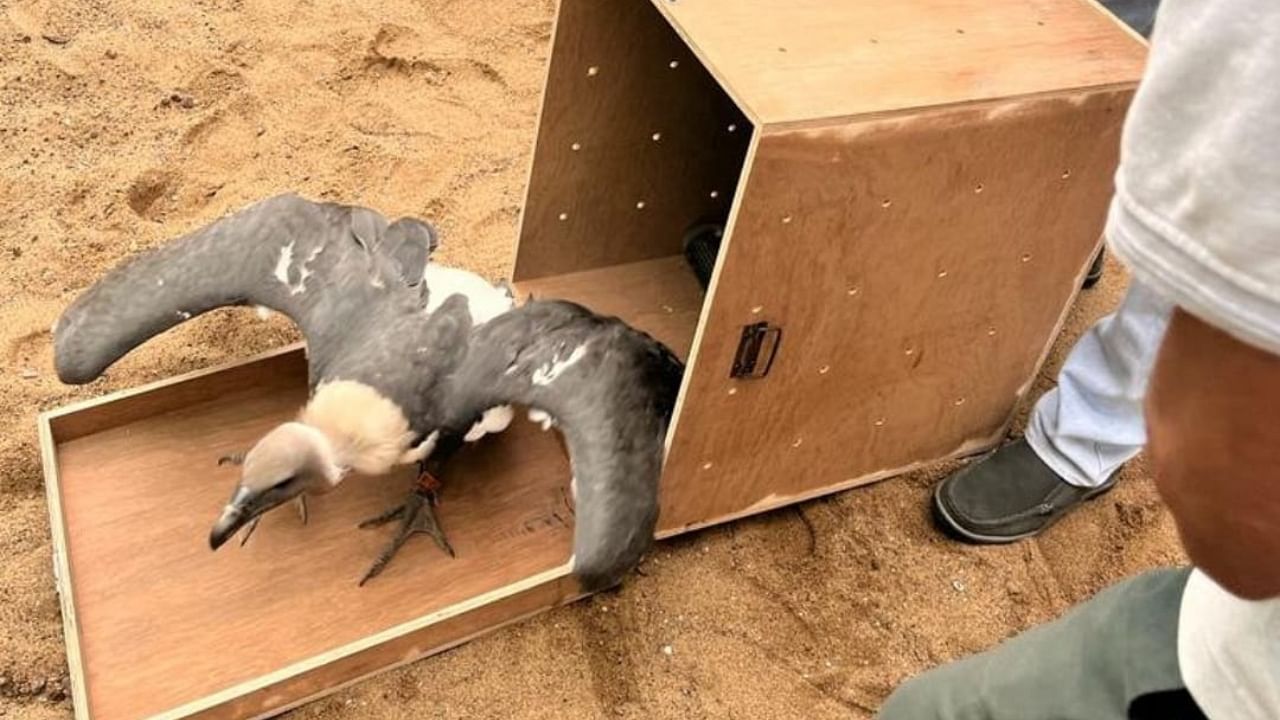
In a big leap in vulture conservation in India, twenty critically-endangered white-rumped vultures (Gyps bengalensis) have been shifted from Pinjore in Haryana to Bhopal in Madhya Pradesh in a meticulously planned operation.
The Mumbai-headquartered Bombay Natural History Society (BNHS), which is playing a lead role in vulture conservation in India, executed the operation with close coordination with forest officials of the two states and the Central Zoo Authority (CZA).
The white-rumped vultures have been shifted from the Jatayu Conservation Breeding Centre at Pinjore, Haryana to the Vulture Conservation Breeding Centre in Bhopal, Madhya Pradesh, by road.
After the operation completed on Saturday, Praveen Pardeshi, President, BNHS, congratulated the BNHS Vulture Conservation Breeding Programme team for this great achievement and the governments of Madhya Pradesh and Haryana for sustained efforts for Jatayu Conservation.
“This will significantly contribute to the conservation breeding efforts at the centre in Bhopal and in the long-term to save Jatayu in Madhya Pradesh and in India,” said Kishor Rithe, Honorary Secretary and Interim Director, BNHS.
Dr Rohan Shringarpure and Nikita Prakash of BNHS led the team of scientists.
Pankaj Goel, Principal Chief Conservator of Forest (Wildlife) and Chief Wildlife Warden, Haryana has permitted the transfer of 20 white-rumped vultures from Pinjore to Bhopal for the genetic management of vultures at the Pinjore centre and increase the founder population of vultures at the Bhopal centre.
The 20 oriental white-rumped vultures were put in boxes and loaded in a 17 seater air-conditioned Tempo Traveller bus which came specially from Bhopal with Dr Shringarpure and Dr Rajat Kulkarni in the helm.
The JCBC Pinjore centre currently houses 399 vultures of the three critically endangered resident Gyps species, and has been actively breeding vultures since 2007. For genetic management, birds which had siblings were selected, and after a comprehensive health check, these birds were chosen for transfer to the Bhopal centre. The selected vultures were in the range of 3 to 8 years. Among the 20 birds, there are five breeding pairs and it is expected that they will breed at Bhopal centre during the approaching breeding season. Ten birds are about 3 years old. “As Haryana has been at the forefront of vulture conservation, the state will encourage such transfers to augment the vulture population, increase breeding and prevent their probable extinction, he stated further,” said Goel.
Shubhoranjan Sen, Additional Principal Chief Conservator of Forests (Wildlife), and Padmapriya Balakrishnan, Director, Van Vihar National Park, released the twenty vultures in the aviary at the conservation breeding centre in Bhopal.
Rithe said the BNHS has been managing four Jatayu conservation breeding centres across the country in partnership with the Government of Haryana in Pinjore, the Government of Madhya Pradesh in Bhopal, the Government of West Bengal in Rajabhatkhawa and the Government of Assam in Rani, Guwahati. “Through this conservation breeding programme, BNHS has contributed in securing the future of vultures in India by breeding more than 700 birds in captivity since 2004 with support from the Ministry of Environment, Forests and Climate Change, the respective State Governments and the Royal Society for the Protection of Birds,” he added.